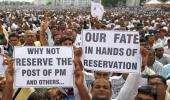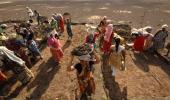'We must not make the mistake of thinking of the caste census as some kind of solution.'
'It is not a solution.'

Professor Satish Deshpande is one of India's leading sociologists.
In the concluding segment of a must-read interview, Professor Deshpande tells Syed Firdaus Ashraf/Rediff.com, "2014 is often seen as a new era free from 'caste politics' meaning, of course, lower caste politics. The Modi era is not recognised as the return of upper caste dominance in politics, which it, of course, is."
- Part 1 of the Interview: 'Not counting caste is as political an act as counting it'
The census in British India made Muslims aware that they are numerically weaker than Hindus, which started the resentment among them finally leading up to Partition. The same way, are you not trying to resent upper castes by bringing in caste census and telling them they are a minority within the Hindu religion?
You are putting the cart before the horse. Census is an aggregation of numbers.
The caste census by itself cannot produce any effect. It can only act as a resource for movements that are already happening.
The caste census itself creates nothing. For example, everyone knows the poor are a vast majority of India. Has that produced any political change? Do we have consolidation of poor people?
And think of caste, everybody knows now, particularly after the Bihar caste survey, what has been India's best kept 'public secret' -- the fact that the upper castes are a minority. But do they behave like a minority?
Is there a popular feeling that the upper castes are a minority? The answer is absolutely not.
Look at how the majority and minority feeling works in the sphere of religion and how it works in the sphere of caste.
Numbers alone are unable to make a social change. Awareness of numbers helps movements, but movements have to exist prior to the numbers.
Some movements have to be there to take advantage of the existing numbers. A majority is not a mathematical thing, but a social thing.
The fact that Hindus constitute 80 percent of India's population, this fact itself is inert. It has to be given a political charge by organisation and mobilisation on the ground.
Somebody has to go around saying, we are all Hindus. We are 80 percent. We are not getting our share, etc, and create a sense of belonging among Hindus, a feeling of outrage and feeling of deprived as a group which creates a movement.
This is what the currently dominant political ideology -- that of the Hindu right and organisations like the RSS and parties like the BJP -- is doing.
Would it be right to say that the census counting of religion has created the monster of communalism?
Whatever your answer to this question, you must recognise the parallels with caste number. Caste numbers also require mobilisation before they become politically charged. And some parties are wanting to do that work of mobilisation.
Is this good or bad? Whatever you answer, will you say the same for religion?
So blaming the census is like shooting the messenger -- it is the 'message' that matters, and the meaning that the message is given.
Is there now an awakening among the backward classes that they are not getting adequate resources according to their population and that upper caste Hindus are cornering all the resources?
Yes, it is because of this awakening that the caste survey has happened in Bihar. It is not the census that is awakening the backward classes, rather it is the awakening in backward classes that has resulted in the census.
Why has the Bihar government dared to do a caste census? It is because the ruling parties there want to harness the caste awakening for their ends. Why are other governments not doing similar things? Because they don't want to address the issues of lower castes, or because they don't see any advantage in it for their politics.
We have had a very simplistic and naive understanding of what is meant by 'caste politics'. We have not recognised it when it is playing a silent invisible role. People have been taught that 'caste politics' only means lower caste politics.
In the Nehruvian era when politics was all in favour of upper castes it was not called as caste politics at that time. But it so happened then that it favoured the upper castes. And we use phrases like 'it so happened' trying to avoid the fact that it too was a kind of caste politics.
The same with the Modi regime. 2014 is often seen as a new era free from 'caste politics' meaning, of course, lower caste politics. The Modi era is not recognised as the return of upper caste dominance in politics, which it, of course, is.
At the same time, I don't want to say that the Nehruvian era was some giant conspiracy by upper castes. That is not necessary; the point is that there was a systematic bias in place. This bias was made invisible by the dominant ideology of the day and this is how ideology works.
Narendra Modi criticised Rahul Gandhi's statement 'Jitni Aabadi Utna Haq' by stating if Hindus started demanding the same thing, then what happens to the minorities of this country who constitute 20 percent of India's population?
Like a good politician, Modiji is invoking the fear of majoritarianism in order to deflect the question of caste, while also simultaneously promoting majoritarianism.
The art of politics is to have your cake and eat it too -- to say one thing, and also say its opposite and yet hint at a third thing. So he is doing that.
His opponents are also trying to do that and counter him. To counter this statement you can always say that there is no such thing as a Hindu majority because Hindus are not one and they are divided.
In particular, upper caste Hindus, who are the core vote bank for the BJP, are a demographic minority. So the larger category of 'Hindus' have always been divided by caste, by class, by region, by sect and many other things.
There have been moments when the caste question has overtaken the religion question, and that has not been good for the BJP. Any movement based on Hindu identity would want to downplay caste.
For many non-BJP parties, the opposite is true -- they want the contradictions of caste to be brought into the open, even if it splits the Hindu vote bank.
The Opposition has no issue to counter Modi's popularity, therefore they are countering him with the caste census.
It is also true that when they find something to counter Prime Minister Modi the media finds fault with that thing. Like you are calling it caste politics...
Why don't you see it this way? When something has been found which Modi cannot dismiss easily, a fault is found with that thing. It is an equally plausible story.
Whatever works against Modi is considered illegitimate. And if it doesn't work against Modi the media will say, see this thing did not work. So Modi is right and the Opposition is wrong.
The point is that for the vast majority of the Indian media today, Modiji can do no wrong. If it looks like he has done some mistake, then it must be an illusion, it must be our fault or someone else's fault -- anyone's fault except Modiji.
And when something does seem to stick to him, to apply to him you turn around and say who is asking this question? ED or income tax raids happen to that person; media trolls him/her; some fault or other is found in any person who is making headway against Modi. Isn't that true?
This does not mean that everyone against Modiji is right. But today we don't have any balance, any room for legitimate criticism of the government whether in the media or in the public discourse.
This is not only about Modiji but any successful authoritarian regime. This is standard technique across the world, like, for example, in the Trump presidency in the United States. But there the media were much more critical, much more ready to do their job of asking difficult questions.
Kanshi Ram in his book The Chamcha Age had warned lower castes that they must not become chamchas of the brahmanical establishment. Do you feel things will change after the caste census and lower castes will hold more power?
We need to think why this has statistically become possible. If we say opportunities are equal, how then statistically there is such a stark difference across castes. We do need to think.
We must not make the mistake of thinking of the caste census as some kind of solution. It is not a solution. Caste census is a step on the way to a possible solution. And a solution will never be singular, but it will be of many things.
It will consist of change of attitude. It will consist of a new kind of consciousness. It will consist of many things, and on that road the caste census will be the first step.
Caste census will be messy and it will make things worse before making things better. But not having a caste census is much worse.
We never talk of politics of not counting caste. Counting caste is politics, but not counting caste is equally politics. It is a different politics.
This politics also needs to be analysed. What are the gains and losses of this politics?
Can we say it is a coincidence that out of India's 100-odd billionaires there are only two Muslims and no one from the lower castes, who form the vast majority of the population?
Things like this, on this scale and for this long a period, do not happen by accident. They happen because of a systematic, strong bias in the system which has been 'normalised' and considered to be okay.
We have to change these things, we have to re-name them as not normal, not okay. This is a long road to travel, and on this road the first small step is caste census.
Asking everybody what is your caste? takes us out of the mentality where only lower caste people are seen as having caste.
And this is a big, big, change, even if it is only the first step on a long journey.











 © 2025
© 2025